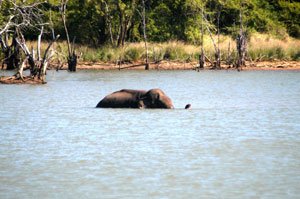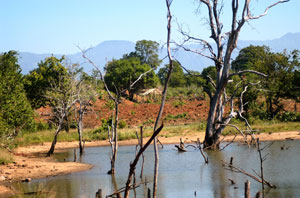“For me, the present is merged in eternity. I may not sacrifice the latter for the present.”
Mahatma Gandhi (1919)
In 2008, a group of men, allegedly with political backing, took it upon themselves to commence the task of having 6, 000 ha of the Uda Walawe National Park cleared and fenced for agriculture and settlement, effectively destroying the Dahaiyagala Sanctuary to its north which serves as an important elephant corridor between Uda Walawe and the Bogahapattiya Forest Reserve. This was against the law of the land, for only a Ministerial Order made and gazetted under the Fauna and Flora Protection Ordinance and duly approved by Parliament can de-gazette a tract of land previously declared as a National Reserve (i.e. a protected area). The Dahaiyagala Sanctuary was so gazetted in 2001, and remains so to this day.
The then Environment Minister, under whose purview these protected areas came, made a statement that the Government had not sanctioned such a clearing of the Park (The Island, September 27, 2008), and according to news reports, visited the area and persuaded the encroachers to stop. But they threatened to return...and they have; in violation of a Supreme Court order.
Importance of Dahaiyagala
Uda Walawe is a haven for over 600 elephants, especially at times of drought, the Park having the only fodder and water in the area for all of their wild number who roam this region. Fundamental to their well-being, and to the reduction of the human – elephant conflict, is the maintenance of the jungle corridors, based on ancient elephant trails, along which these animals can move between areas of protection.
The importance of this area for conservation, and for the reduction of the human – elephant conflict, is supported by an intensive three-year PhD study of the movements of the elephants being carried out at Uda Walawe. One chapter deals with the importance of Dahaiyagala in the movements of elephants to and from the Park:
Most of this exchange seems to be traffic between the Bogahapattiya Sanctuary and UWNP via the Dahaiyagala sanctuary.
An important discovery is that the elephant population making use of Uda Walawe is much larger than previously thought. Restricting movement of this population therefore means trying to restrain not a mere 500 animals, but well over 750.
 |
| An elephant takes a dip in the waters of Dahaiyagala Sanctuary |
S. R. De Silva 2008, Uda Walawe National Park Elephant Population Status Report.
The advantage of Habitat (Elephant) Corridors is that they reduced the necessity for animals to stray out of the protected areas in search of water and food. With ready access to their seasonal feeding grounds, even the elephants, particularly the herds of females and their calves, have no need to stray in search of human-grown products, thereby reducing the human – elephant conflict.
These corridors also serve as an important highway for the interchange of genes, of as vital importance as sustenance in the preservation of a species. Genetic isolation invariably results in extinction.
Increasing the conflict
Good environmental management and conservation is not about the preservation of the wilderness and wild animals alone. Most importantly, especially in this island whose history and future are rooted in agriculture, it is about the protection of water – the preservation of the forests that attract rain, and of the catchment areas that collect and conserve the water for use by humans.
Yes, this is really about the conservation of the people of Uda Walawe and all those downstream of the Walawe Ganga who benefit from its waters. Its borders are plagued by seasonal drought, landslides at Koslanda, and the human – elephant conflict. Rather than preserve the trees and soil that will protect and bring return to the environmental fertility of this region, unscrupulous politicians pressure these hard-working people to try and destroy their futures too.
No trees, no rain. No trees, no water. No trees, more landslides. No elephants, no income from responsible eco-based tourism. Place a fence across the Dahaiyagala Sanctuary, and 600 elephants, including the majestic tuskers of Uda Walawe, will have no option but to encroach on human habitation to find food. The human – elephant conflict in this area would increase a hundred-fold, as will the suffering of both people and elephants. Little matter to insincere politicians whose only goal is cheap politics and the profits of the illegally harvested timber.
Trapping a human population in poverty
A Central Bank Report for 2009 states that agriculture contributes 11.9% of the Domestic Income (GDP) of Sri Lanka. Yet, over 30% of the Labour Force is employed in this sector. Uda Walawe is surrounded by subsistence farmers. Another study has shown that these subsistence farmers earn just Rs. 25, 000 to Rs. 30,000 a year. A pittance.
Contrast this with a recent World Bank Report, prepared for a $30 Million conservation project for Sri Lanka which states that the anticipated revenue from responsible eco-based tourism to Sri Lanka will result in an additional 14 cents of foreign exchange being earned for the country for every $1 made. Multiply this by the huge number of tourists expected into this country now that the war is over, and a vast amount of revenue can be earned for this country by the preservation of the wild places and wild creatures of Sri Lanka.
The aforementioned project also envisages local populations benefiting directly from this increased visitation to the Park. Fundamental to the success of this project is the integration of the lands held by the Forestry Department and the Department of Wildlife Conservation, and this is why Dahaiyagala, which connects Uda Walawe and Bogahapattiya, is so important.
 |
| Banana cultivation blocking a fence |
The same Central Bank report shows that 15% of the population of this nation lives below the poverty line. From the figures above it can be assumed that a fair representative of subsistence farmers contribute to this number. Why is it that politicians wish to keep them trapped in poverty?
It is interesting to note that the majority of the local population immediately affected by the fence have signed a petition in favour of it. Those who opposed it were bussed in from elsewhere, and some have already been rewarded for their efforts by being permitted to illegally clear land within the Dahaiyagala Sanctuary.
There may be other, more sinister forces at work in this area. The Daily Mirror of November 1, 2010 and again of November 9, 2010 reported that the STF had raided and destroyed areas of over 20 acres of ganja plantations in the vicinity. In addition, there are close to a hundred thousand head of cattle being illegally corralled and grazed within the National Park and the Forest Reserve areas. A well patrolled and protected wildlife sanctuary would put these lucrative trades out of business!
A lawless nation?
The senior management of DWC has behaved abjectly in this whole episode, for it is reliably known that they had prior knowledge of this impending act of land piracy. One has sympathy for the field staff of Uda Walawe who risk life and limb to protect this national treasure, only to see their lords and masters merely look the other way! Alas, no longer do public administrators stand up to their political masters to defend that which is 'right'!
As with several other issues of national importance of late, in 2008, it was left to the citizens of this nation to look to the courts to assist in preserving the tenets of democracy in this land. And so the Wildlife and Nature Protection Society, along with the Environmental Foundation Limited, and the Wilderness and Protected Areas Foundation petitioned the Supreme Court to stop this act of madness that appears to benefit only a handful at the expense of the nation. It is the settlement worked out with the sanction of the Supreme Court that is now being so blatantly flouted. Have we become a lawless nation?
It is reliably learned that the President, on being informed of a similar such politically engineered encroachment into a sanctuary north of the Wilpattu National Park, had instructed the Inspector General of Police to look into the matter and immediately evict the illegal squatters on the land. It is hoped that the President will take account of this encroachment too. But do the citizens of this nation have always to seek the assistance of the President to see that justice is carried out, so that the natural wealth of this nation is preserved for posterity and not pilfered, and irreparably damaged, by the unscrupulous for immediate gain?
“No one has the right to interfere with the judiciary and its independence...
No one has the right to go against the country's law and order. If a country is to progress, law and order should function...” President of Sri Lanka, Mahinda Rajapaksa,
Daily News, November 8, 2010.
|



